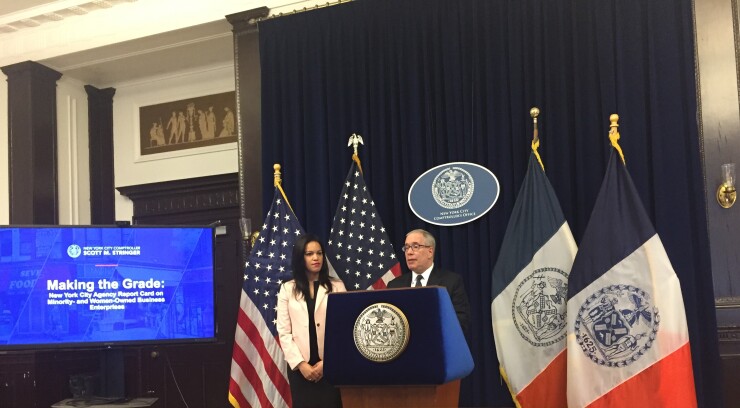New York City gets a D-plus under an evaluation of city agencies' contracting with minority- and women-owned businesses released by City Comptroller Scott Stringer on Thursday.
The comptroller’s fourth annual “
“Four years ago, we launched this groundbreaking report to elevate conversation about fairness in our economy,” Stringer said at a press conference at the Dinkins Municipal Building in Manhattan. “Today, progress is happening. For decades, the deck has been stacked against MWBEs. But now, we’re seeing steps in the right direction.”

The report awards agency grades based on the actual spending in each fiscal year, rather than the registered value of contracts, which doesn’t reflect actual spending and may span multiple years.
The city’s Commission on Human Rights, the Department for the Aging, and the Department of Small Businesses Services, which received grades of C, D and D in FY 2014, respectively, all received A grades this year.
However, four agencies received F grades, with the Department of Buildings, the Department of Citywide Administrative Services, the Department of Sanitation, and the Department of Transportation all scoring the lowest marks.
Stringer issued a series of policy recommendations for the city in order to attain the de Blasio Administration’s goal of certifying 9,000 MWBEs by 2019 and awarding 30% of the dollar value of contracts to MWBEs by 2021.
He calls on the city to:
- Assess large contracts with upcoming renewals and consider re-bidding to create new MWBE opportunities;
- Establish a group of all certifying bodies and relevant stakeholders to streamline the certification process through a universal certification system. Even with recent improvements, the current MWBE certification process is too cumbersome. As many as 10 separate entities certify MWBEs and each have different processes that vary in their requirements; and
- Hire a full time Chief Diversity Officer at every city agency to focus exclusively on MWBE accountability, just like comptroller’s office has done. Similar to an MWBE Officer, the CDO would report directly to the agency head. However, MWBE accountability would be the full time focus of the CDO, rather than just one part of their larger portfolio.
In FY 2017, the city awarded $21 billion total in goods and services contracts to outside vendors. Of all citywide contracts, just over $1 billion was awarded to MWBEs, which was 4.9% of all citywide awards, up from 4.8% a year ago and 3.9% in FY 2014.
Stringer also spoke about several financial programs that his office runs, such as the MWBE
The city now has $12 billion invested with MWBE managers, an increase of 25% since 2013.
Specific asset classes have seen large increases: Private equity investments with MWBE managers grew to 20% from 14%; MWBE-managed opportunistic fixed income investments increased to 6% from 0%; and investments with MWBE-run hedge funds jumped to 13% from 0%, despite 97% hedge fund ownership by white men.
The comptroller’s office received a B grade for the second straight year. In fiscal 2017, the office spent $3.3 million with MWBEs, or 24.3% of total office procurement.
Stringer has also initiated a
“This issue is about growing our neighborhoods by delivering real, community-level wealth creation,” Stringer said. “It’s critical to tackling our affordability crisis, and let there be no doubt that the city has a long way to go.”





